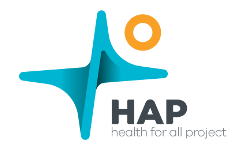
Currently, there are 18 positive cases in Dibra and Fier districts (9 in each district), all self-isolated at home. Teams from the relevant health centers and/or health posts are monitoring the health of all infected people.
Family doctors of the Fier districts have attended the online training hosted by the Health Care Services Operator on the role of the family physician in screening, managing and referring cases with COVID -19 infection.
Following the guidelines of the MHSS on the re-opening of some activities, amongst which, the training courses, some health centers are taking measures to organize training within the team regarding the prevention and control of COVID-19 infection, based on training materials drafted and published by HAP.
Some teams are working to resumption the Peer Groups (a form of Continuous Education introduced and supported by HAP) discontinued due to measures to prevent and control the spread of COVID-19 infection. The Health for All project is open to support PHC teams across the country by making available training materials in editable formats. You can apply for training materials at info@hap.org.al
Primary Healthcare teams, in cooperation with the relevant LHCU, continue to be present in secondary education schools to monitor the implementation of Instruction “Staying and Movement in School (COVID-19)”. Nertila Giçi, nurse at HC No. 1, Lushnja, tells us about her experience at “Jani Nushi” school: “My work at the school consists of measuring the temperature with a digital thermometer to all students and teachers before entering the school premises, spraying with alcohol or hand disinfectant, advice and check the good use of masks, check the observation of the distances in the school yard, while walking, and between desks, the hygienic-sanitary control of the premises according to the protocol, advice and control of hygiene procedures for cleaning hands with water and soap, as well as checking each student for any health issues. From the trainings provided to us by the HAP project, it was easier for me to provide advice on the taken measures and in managing the situations.”
Cooperation at local level
After several months as a green area, there are some positive cases with COVID-19 infection identified in Mat municipality (in Uraka village). Rukaj health center team and Uraka health post is monitoring the health condition of the people, most of whom asymptomatic. We spoke to Dr. Shpëtim Ruka, family physician and director of Rukaj HC, who tells us more about the work that is carried out in order to prevent the further spread of the infection:
Dr. Shpëtim, how did you get notified of the first COVID-19 cases in the area covered by your center?
On May 28, I was contacted by the relatives of a patient who had been hospitalized for several days at the Internal Diseases Hospital, but had been transferred to the Infectious Diseases Hospital after testing positive for COVID-19 (although it had previously been negative). I immediately contacted the epidemiologist and a team from the district’s epidemiological services began taking the tests to the contact persons. As of June 2, 9 people have tested positive, mostly asymptomatic. Since the first day, the premises have been disinfected and measures have been taken with the municipal administrator to enable the delivery of food aid.
How specifically is the health of the suspected/infected people with COVID-19 infection monitored?
Immediately after receiving the news, we contacted the family members and people who had had contact with the patient so that they be quarantined. The two nurses of Uraka health post communicate 3-4 times a day with the infected people via phone calls to monitor their health conditions. I have personally delivered medications for fever and cough management (if they have symptoms) as well as medications to chronic patients. So far, only one person has had a fever of up to 38oC, whereas the other patients continue to be asymptomatic.
What is the most common challenge you face?
The biggest challenge we have encountered is the supply of protective equipment, as being a green area, we had somewhat neglected the requirement to be provided with them. The use of equipment was necessary with the confirmation of the cases, and the fact that we had insufficient quantities was a real challenge. It is also challenging to communicate on the phone all the time with contact persons, either infected or not, who are scared. The persuasive work with the community requires also a lot of efforts as it is difficult for people to understand the risk of staying in groups and in bars.

